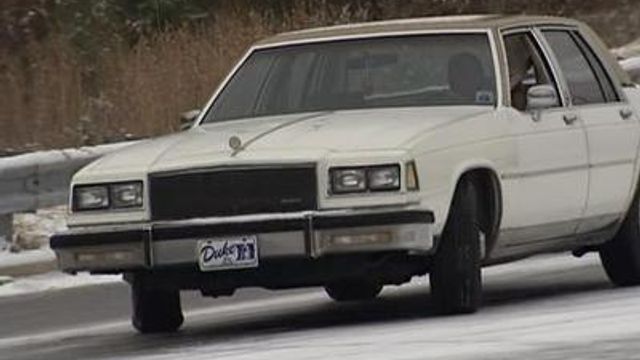If you must drive, prepare, take care
"If you don't need to drive, don't be on the roads, please," Highway Patrol spokesman Sgt. Jeff Gordon said Friday.
Posted — UpdatedIn light of forecast snow, sleet and ice, the North Carolina Department of Transportation and the North Carolina Highway Patrol is asking motorists to stay at home, if at all possible.
"If you don't need to drive, don't be on the roads, please," Highway Patrol spokesman Sgt. Jeff Gordon says. "That's the No. 1 thing."
But if you must, here's some tips on navigating the roads safely:
- Clear your vehicle's windows and mirrors.
- Reduce your speed. Driving at the regular speed limit will reduce your ability to control the car if you begin to slide. Do not use cruise control.
- On a four-lane highway, stay in the clearest lane and drive only in paths that are already cleared. Do not try to change lanes.
- Leave plenty of room between you and other vehicles. Highway safety experts recommend keeping the distance of four cars between you and other vehicles for every 10 mph you're driving.
- Bridges and overpasses accumulate ice first. Approach them with extreme caution, and do not apply your brakes while on the bridge.
- If you do begin to slide, take your foot off the gas, and turn the steering wheel in the direction of the slide. Do not apply the brakes as that will cause further loss of control of the car.
- Come to a complete stop or yield the right-of-way at intersections where traffic lights are out. Treat this situation as a four-way stop.
- If you have a cellular phone, take it with you. You can call the Highway Patrol statewide by dialing *HP (*47) or call the local county emergency center by dialing 911. Call 511 for information about highway travel conditions; do not call 911 for that information.
If you become trapped in your car:
- Pull off the highway; stay calm, and remain in your vehicle. At night, turn on the inside dome light, so work and rescue crews can see you.
- Set your directional lights to "flashing," and hang a cloth or distress flag from the radio aerial or window. In a rural or wilderness area, spread a large cloth over the snow to attract attention of rescue crews who might be surveying the area by airplane.
- Do not set out on foot unless you can see a building close by where you know you can take shelter.
- If you run the engine to keep warm, open a window slightly for ventilation. This will protect you from possible carbon-monoxide poisoning. Periodically, clear away snow from the exhaust pipe.
- Exercise to maintain body heat, but avoid overexertion. In extreme cold, use road maps, seat covers and floor mats for insulation. Huddle with passengers, and use your coat as a blanket.
- Never let everyone in the car sleep at once. One person should stay awake to look out for rescue crews.
- Be careful not to use battery power. Balance electrical energy needs – the use of lights, heat and radio – with your supply.
If you are involved in a wreck, here are some ways to prevent further injuries, reduce costs and speed up the repair process:
- Protect yourself from the start. Use your cell phone or a camera to take photos of the scene and the vehicles involved.
- Move the vehicles and all of the people involved well out of the way so they don't cause another wreck.
- Before you have your vehicle towed to a repair shop, get references and check the shop's status with the Better Business Bureau.
- Since the average crash repair costs more than $2,200, get a written estimate before any work begins.
- Have patience. Severe weather often means it will be busy at auto repair shops.
- If the wreck is minor, you and the other driver might decide to handle the damages without involving insurance companies. There are risks, however: You or the other driver might later change your mind; the other driver might claim injuries, and that could create more problems than just higher insurance rates.
Consider these tips for winterizing your vehicle:
- Squeak-proof your wipers with rubbing alcohol or ammonia. It can make badly streaking and squeaking wipers change to near-perfect silence and clarity.
- Keep your headlights clear with car wax. It can last up to six weeks and contains special water repellents that will prevent messy mixture from accumulating.
- Ice-proof your windows with vinegar. Vinegar contains acetic acid, which raises the melting point of water, preventing it from freezing. Fill a spray bottle with three parts vinegar to one part water and spray it on your windows at night.
- Prevent car doors from freezing shut with cooking spray! Spray cooking oil on the rubber seals around car doors & rub it in with a paper towel. The cooking spray prevents water from melting into the rubber.
- De-ice your door locks with hand sanitizer.
Copyright 2024 by Capitol Broadcasting Company. All rights reserved. This material may not be published, broadcast, rewritten or redistributed.






